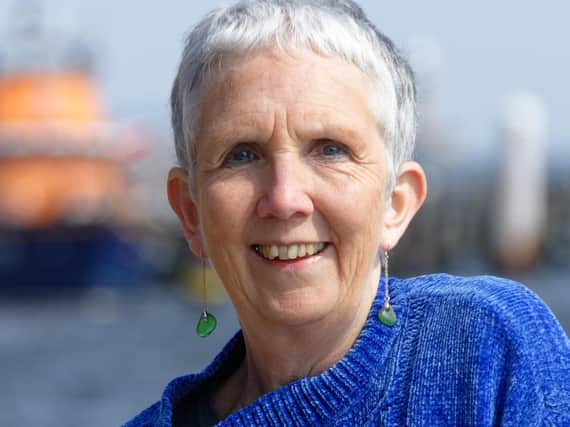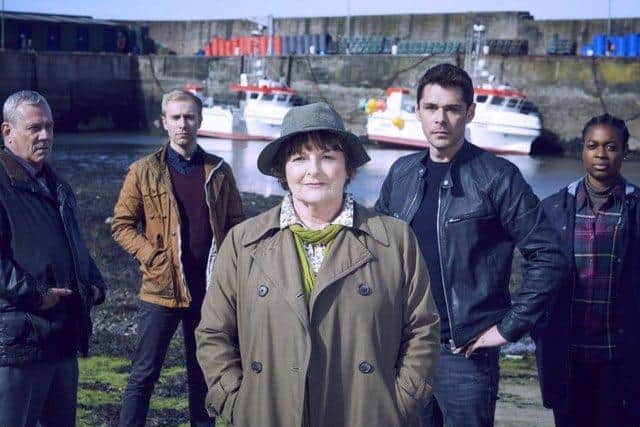Ann Cleeves on Vera, Shetland and reading for health before Harrogate's Theakston Old Peculier Crime Writing Festival


Murder mysteries might be what gets Ann Cleeves out of bed and sat at her kitchen table by 6.30am ready to write each morning – after living on islands, she still wakes with the shipping forecast – but crime authors are actually some of the friendliest in the business.
“The myth is that we get rid of all our aggression on the page, I’m not sure that’s true,” says the award-winner, who lives in Whitley Bay.
Advertisement
Hide AdAdvertisement
Hide Ad“In the past we’ve always been looked down on a bit and so we absolutely refused to be pretentious or snobby or take ourselves too seriously. I think that’s what makes us such good company when we get together.”


Though she was writing for 20 years without commercial success, Cleeves is having the last laugh in that regard: her DCI Vera Stanhope books have been translated into more than 20 languages and the ITV television drama adaptation has been sold to more than 200 territories around the world.
This was followed by the success of her Shetland books about DI Jimmy Perez, which also continue to get the small screen treatment from the BBC.
Now the team behind those shows, Silverprint Pictures, is developing The Long Call, adapted from the first novel in the Two Rivers series, which will also be on ITV.
Advertisement
Hide AdAdvertisement
Hide AdAnd that’s what Cleeves will discuss tomorrow with her friend, the presenter Steph McGovern, at the Theakston Old Peculier Crime Writing Festival at the Old Swan Hotel in Harrogate (where Agatha Christie herself could be found after disappearing in 1926).
Cleeves grew up in the country, first in Herefordshire, and later in North Devon.
She dropped out of university and worked jobs including child care officer, women’s refuge leader and auxiliary coastguard before going back to college and training to be a probation officer.
While she was working as a cook in the bird observatory on Fair Isle, she met her late husband Tim, with whom she had two daughters and moved to Northumberland in 1987.
Advertisement
Hide AdAdvertisement
Hide AdIn October 2017, Cleeves was presented with the Diamond Dagger of the Crime Writers’ Association, seen as the genre’s highest honour.
Vera was picked up for TV after Elaine Collins, an executive for ITV, bought a second-hand copy of The Crow Trap in a London Oxfam shop.
The author says she has no qualms about handing her stories over to TV producers. “I’m not at all precious about it because I think that I don’t know anything about making good television,” she says. “[Silverprint] do obviously know what makes good, popular TV because it’s obviously worked in the past, so I’m quite relaxed about it.
“And it always seemed to me that it wasn’t that different from giving a book to readers. A book doesn’t really belong to you once it’s in the hands of a reader, because they have their own imagination and their own creativity and the pictures they see in their heads when they read the book are going to be quite different from the pictures that I had in my head when I wrote it. And so really giving it to a scriptwriter and a director isn’t very different. And then, I love that process of storytelling and moulding the book, and I don’t really want to meddle with other people’s creative ideas because they’ll have quite a clear vision of what they want the final product to be. And if I’m there every five minutes saying ‘Oh my character wouldn’t say that’, or ‘Oh my character wouldn’t do that’, then you muddy that vision and it’s not going to be as good, I don’t think, so I just let them get on with it.”
Advertisement
Hide AdAdvertisement
Hide AdThe Long Call is based in Devon, where Cleeves, 66, grew up. She hopes that through her work she can help people to “see things a bit differently”.
She says: “I’m trying, perhaps, to give a voice to people who might not have a voice usually, and I do that quite a lot in the Vera books too, I think. So one of the heroes of The Long Call is a woman with Down’s syndrome, and just talking to a friend with Down’s syndrome and getting her input was great fun and seeing that character come alive on the page and saying things and doing stuff and being really brave just felt like a fun thing to do.”
In Vera, stereotypical depictions of women detectives are subverted by the presence of DCI Stanhope, who is large and middle-aged.
The act of reading itself can be seen as a kind of therapy, and Cleeves has funded a project in the north-east that introduces people to literature to help with their wellbeing. This was an idea she was introduced to while working in Yorkshire around 15 or so years ago.
Advertisement
Hide AdAdvertisement
Hide Ad“It was before I could give up the day job. I was being published every year but just not being very commercially successful, so I had this day job as reader development officer at the Kirklees libraries which was promoting reading in all its forms and organising reading groups and events and it was a just a fabulous job.
“But Kirklees, at that point, had already started what they called the Bibliotherapy Scheme, which was promoting reading as a way to wellbeing and health. And it sort of faded and died with austerity and budget cuts and things.”
Five areas in the north-east – Northumberland, North Tyneside, Gateshead, Co Durham and South Tees – are now taking part in the project.
Doctors can refer people may be struggling with chronic pain, anxiety, stress, depression or loneliness to reading workers, who will provide friendship and listen to them, as well as offering access to books, enthusiastic librarians and other readers.
Advertisement
Hide AdAdvertisement
Hide AdThe Reading for Wellbeing project has research grants and organisers are working with Public Health England, GPs and library staff, says Cleeves.
“We’ve appointed seven workers now who are going out and GPs will prescribe membership of a reading group or introduction to a reading project worker, and we’ll just see if it works, if getting lost in a book will help you if you’ve got mild depression or chronic back pain,” she says.
Reading can also have a role in healing a divided society, believes the prolific writer, who in 2016 celebrated the publication of her 30th book in 30 years.
“It’s a time when we’re so polarised and so bitter and people with different views just not willing to listen, but fiction can do that because you do have to see the world through somebody else’s eyes and I think for the reading and health project, my sense is that if you’ve got weird ideas rattling around in your head and you’re scared and you’re just not in a very good place, putting yourself inside somebody else’s head for a bit, and hearing their thoughts and living their life can surely be some kind of escape and help.”
Advertisement
Hide AdAdvertisement
Hide AdCleeves has also helped to set up reading groups in pubs around the Yorkshire Dales. When she needs to read for her own comfort, she goes back to old traditional crime fiction.
“That’s terrific,” she says. “The 1930s, when the baddie always gets his comeuppance and order is restored at the end and all’s well with the world, because in the 1930s they needed that too. Because people might think of Downton Abbey, but the 1930s was the Jarrow hunger marches and the General Strike and just people not having enough to eat. And yet, these country house murder mysteries were what people were reading between the wars and that’s quite interesting too I think.”
Viewers can also expect the 11th outing of Vera and sixth of Shetland to appear on television in the near future.
The popularity of these shows is “surreal”, she says. “Wherever you go in the world, on some strange streaming channel, you’re likely to get a Vera popping up, which is lovely and it’s a compliment – but it’s also a showcase for the North of England.”